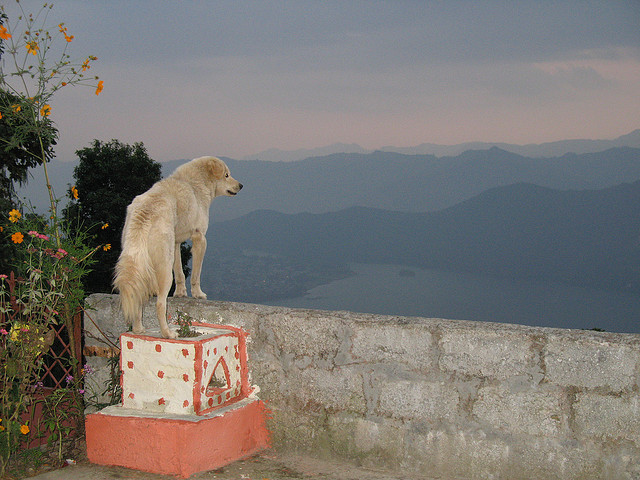I spent a couple of months touring Nepal in late 2007. I learnt a lot about the role of tourism and volunteering in rural village communities. Volunteer tourism is often matched by a homestay so that the visitor can better understand the local culture and customs. This includes having the authentic experience of home-cooked food-my favorite part.
Let me first paint a picture of this region. I stayed with a family in the village of Padeli, halfway up the hill to the Sarangkot viewpoint. From this viewpoint one can see the full glory of the Himalayan ranges of the Annapurnas and Machhapuchhare, and also go paragliding. To get there from Pokhara, Nepal’s 2nd largest city, you can take a bus on a precarious hill-winding journey. The area suffered from major landslides during the 2007 monsoon, so it was a miracle that buses still went up this hill. The hills are mainly soil and slate and thus easily disturbed. The scarring is very evident on the landscape. Lots of rice fields were literally wiped out and paths obliterated.
I had the luxury of a host ‘’dad’’ who spoke decent English. One can get by with low levels of conversational English but making an effort to learn Nepali can take you a long way! Two things were in abundance here: Water and Dal Bhat (Lentils and Rice). Water was sourced from a constantly dripping well used by the villagers. There was so much that the surplus was used for the domestic buffalo bathing pools. Dal Bhat needs no introduction—it’s the staple in Nepal and sustainably vegetarian. The slow pace and lack of privacy was another thing to get used to. There were so many kids here that every time they said “hi’’ I had to keep asking their names.
The number one priority of developing countries when it comes to getting anywhere: good roads. Until 10 years ago, you could only get to Padeli by ox and cart. The community pooled together money to widen the tracks and cut new routes on the hillside. It seemed to work well with motorcycles, 4wd vehicles and the rickety commuter buses (with really cool horn sounds), but landslides have made some sections impassable during the rainy season. Not only is good infrastructure important for living everyday life, but also for attracting visitors and tourists. An infrastructure investment that withstands landslides will be important for the sustainability of the community.
After the transportation infrastructure is in place for people to reach a rural tourism community, one has to have the basic necessities such as clean water for visitors. The Padeli village community shared a well amongst themselves. It had been gushing groundwater for centuries but was threatened by the landslides. Luckily, the source was not damaged but the point of collection (concealed rock pools) became easily contaminated since people waded into the pools to collect water for drinking and also wash themselves and clothes there. An independent consultancy proposed creating an underground tank to collect the groundwater but it would have meant sacrificing some community farms, so their proposal was rejected by the village committee. It turned out that fixing the well was far more important than improving the road as it was one abundant life or death source that, if compromised, would greatly inconvenience villagers who had no alternatives (only a few areas had piped water).
There was a serious issue of educational continuity in this village. Most kids didn’t get past the secondary school exams. One family suffered doubly from loss of crop during the monsoon season and the father was suffering from cancer. Two elder children had to stop their college studies and dedicate their time and money to taking care of him and financing his chemotherapy. And as if that was not enough, they were in the middle of a land dispute with “some guy” from the valley. One of the older girls had given up on any other career options and was going to work on becoming a commercial farmer. There was no such thing as a singular career aspiration. Some men beyond college age became the hustlers of the fields. One guy advertised services ranging from paragliding to pimping to herbs (the ones that you can roll).
Tourism widens the range of skills that the youth can gain (trekking, arts and curios, adventure sports, conservation) but it’s weird how tourism can be good and bad for the country at the same time. The Sarangkot viewpoint attracted tourists to visit Padeli, but the bigger returns of being a middleman tempted the unemployed youth to flog whatever junk the tourists are were willing to buy. Volunteer tourism helps, in a meaningful way, bridge the gap between a local community offering of their culture and heritage and the segments of the tourism community that are sustainability conscious.


